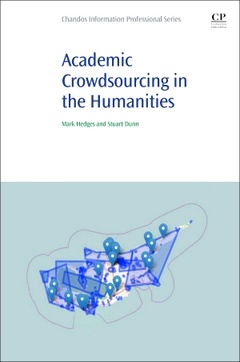Academic Crowdsourcing in the Humanities Crowds, Communities and Co-production Chandos Information Professional Series
Auteurs : Hedges Mark, Dunn Stuart

Academic Crowdsourcing in the Humanities lays the foundations for a theoretical framework to understand the value of crowdsourcing, an avenue that is increasingly becoming important to academia as the web transforms collaboration and communication and blurs institutional and professional boundaries. Crowdsourcing projects in the humanities have, for the most part, focused on the generation or enhancement of content in a variety of ways, leveraging the rich resources of knowledge, creativity, effort and interest among the public to contribute to academic discourse. This book explores methodologies, tactics and the "citizen science" involved.
1. Introduction: academic crowdsourcing from the periphery to the centre 2. From citizen science to community co-production 3. Processes and products: a typology of crowdsourcing 4. Crowdsourcing applied: case studies 5. Roles and communities 6. Motivations and benefits 7. Ethical issues in humanities crowdsourcing 8. Crowdsourcing and memory 9. Crowds past, present and future
Researchers and graduate students in the digital humanities; researchers and graduate students in library and information science; information professionals in higher education and research institutions, including academic librarians.
Stuart Dunn is Senior Lecturer in Digital Humanities at King’s College London. He gained his PhD in Aegean Bronze Age Archaeology from the University of Durham in 2002, during which he conducted fieldwork in Melos, Crete and Santorini. During his PhD and subsequently, he developed strong interests in digital research methods for mapping and spatial analysis. He worked as Research Assistant on the AHRC’s ICT in Arts and Humanities Research Programme from 2003 until 2006, where he supported the design and implementation of key research programmes. In 2006, he became a Research Associate at the Arts and Humanities e-Science Support Centre at King’s, and then a Research Fellow in the Centre for e-Research. Since 2011, he has taught in the fields of cultural heritage, digital history and, most recently, Geographical Information Systems. In this period he has researched and published extensively on academic crowdsourcing as a method, especially where it touches on the field of Volunteered Geographic Information. Dunn is a Fellow of the Higher
- Addresses crowdsourcing for the humanities and cultural material
- Provides a systematic, academic analysis of crowdsourcing concepts and methodologies
- Situates crowdsourcing conceptually within the context of related concepts, such as ‘citizen science’, ‘wisdom of crowds’, and ‘public engagement’
Date de parution : 11-2017
Ouvrage de 190 p.
15x22.8 cm



